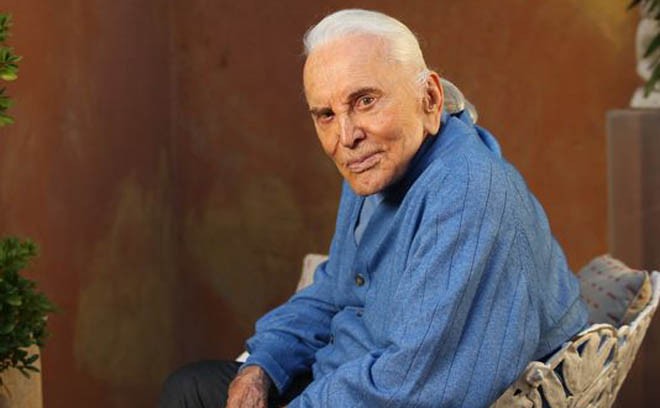
Kirk Douglas was not just an anti-war hero on-screen, but is a role model in real life too working for the welfare of the needy

It is easy to be a hero in films; it is much more demanding to become a role model in real life. For that, one needs to either defy conventional wisdom and challenge authority or do something for the welfare and development of common people. Kirk Douglas has done all of this. When his family celebrated his 100th birthday on Dec 9, 2016, he was not on a wheelchair; he walked, laughed, and quipped with jest. If you live till hundred, you need to be like him.
How did Kirk become a hero in real life? Well, 1950s and 60s was a time in America when anti-communist paranoia was at its height; war was glorified, individual interest was eulogised and art or culture was subservient to profit. In that atmosphere, Hollywood also witnessed a battle of ideas, though without a level-playing field. There were some who saw through the war hysteria and were keen to show the cut-throat capitalism as it was, with warts and all. They wanted to protect artists’ interests by showcasing their creativity and sensitivity with sympathy.
But most were not so keen. Kirk belonged to the former. His best movies are those in which he portrayed the dominance of self-interest in a negative light. Starting from The Strange Love of Martha Ivers (1946) and Champion (1949) to Ace in the Hole (1951) and The Bad and the Beautiful (1952), his characters make you think how an obsession with personal gain can destroy relationships, reputations, and mutual respect in society. Champion is a film noir drama sports film that recounts the struggles of a boxer who tries to push himself to the top not only by knocking out opponents but also by backstabbing his friends.
Ace in the Hole is a must-see movie for all journalists. In fact, it should be mandatory course material in business and mass communication classes. A cynical, disgraced reporter tries to regain a job at a major newspaper and in the process stops at nothing. Billy Wilder who had just a year earlier written and directed his masterpiece Sunset Boulevard (1950) repeated his feat in another great flick that initially drew flak but is now considered a classic film about media insensitivity and morbid expectancy of public in situations of tragedy. No surprise that it was a commercial failure for its audacity to show mirror to society.
Kirk Douglas did the same in The Bad and the Beautiful , directed by Vincent Minnelli. Here a film producer is the victim of his own ambitions to reach the top. Just like Champion and Ace, here Kirk is an embodiment of a selfish professional who has to fight and destroy others to seek a status in a ruthlessly commercial world. The dénouement is self-destruction and annihilation of morals and ethics. His next three films -- Lust for Life, Paths of Glory, and Spartacus -- are exactly the opposite of what he delineated in his earlier films.
The message is almost the same but his characters assume a positive persona. Now he is standing on the other side of the fence. He is no more a vile villain, rather he is a victim of a vicious society or a valiant defender of people’s rights to dignity, freedom, and peace. Again directed by Minnelli, Lust for Life (1956) is a biopic of the Dutch painter, Vincent van Gogh (1853-90). It was based on the novel of Irving Stone who later became even more famous with his book about Michelangelo - also made into a film The Agony and the Ecstasy.
Kirk Douglas could have won an Oscar for his brilliant performance as Vincent in Lust for Life but the best actor prize in 1956 went to another superb performer Yul Brynner for King and I. Nor did Kirk win any award for his absorbing performance in the great anti-war movie Paths of Glory (1957) where he plays the commanding officer of French soldiers who refuse to continue a suicidal attack against Germany in World War I. The officer (Kirk) stands against a military court to defend his soldiers charged of cowardice.
He is unable to prevent a court-martial but his advocacy for sanity and pleas to ponder move the audience to hate war. Kirk Douglas capped his winning streak with Spartacus (1960) -- an epic historical drama about a slave revolt directed by Stanley Kubrick. The Screenplay writer, Dalton Trumbo, had been blacklisted by studios for his alleged involvement in communist politics. Kirk Douglas not only defied the ban but also gave him his writing credits on screen and -- by doing so -- he contributed towards an end to the witch-hunt initiated by the House Un-American Activities Committee (HUAC).
In later years, Kirk Douglas became a philanthropist and donated millions of dollars -- more than a 100m -- for welfare and development of communities in need of help. He helped the homeless, the victims of Alzheimer’s disease and funded the refurbishment of over 400 playgrounds for children, just to name some of his contributions. What else could a real hero do?